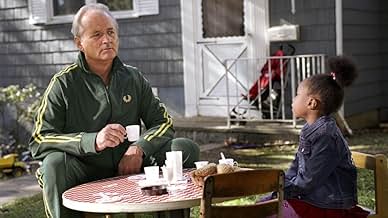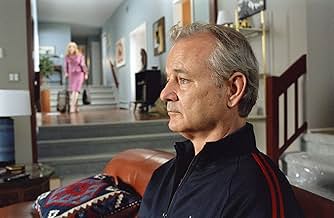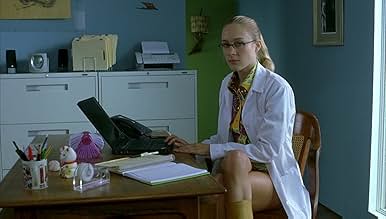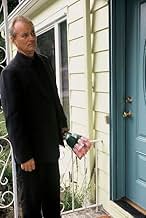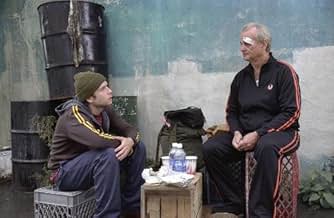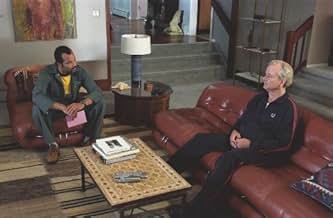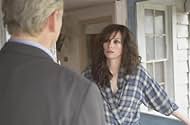ÉVALUATION IMDb
7,1/10
109 k
MA NOTE
Célibataire endurci, Don Johnston, reçoit la lettre anonyme d'une ancienne petite amie, l'informant qu'il a un fils. Un voisin détective le convainc d'entreprendre un périple à la recherche ... Tout lireCélibataire endurci, Don Johnston, reçoit la lettre anonyme d'une ancienne petite amie, l'informant qu'il a un fils. Un voisin détective le convainc d'entreprendre un périple à la recherche de ses anciennes amours.Célibataire endurci, Don Johnston, reçoit la lettre anonyme d'une ancienne petite amie, l'informant qu'il a un fils. Un voisin détective le convainc d'entreprendre un périple à la recherche de ses anciennes amours.
- Director
- Writers
- Stars
- Prix
- 5 victoires et 14 nominations au total
Jarry Fall
- Winston and Mona's Kid
- (as Jarry)
Saul Holland
- Winston and Mona's Kid
- (as Saul)
Avis en vedette
This according to some people is Jim Jamusch's mainstream movie, well to me it is still an independent movie it just so happens that everyone likes it and rightly so. It is a subtle tale filled with meditations on life, ageing, love and loss. The film opens with a pink letter and the viewer sort of follows it on a mini road trip from post box to sort room to final delivery. It is a beautiful metaphor for the journey you are about to undertake with Bill Murray's character Don Johnston. Everything in this film is set up so well from Don's name (a cross between Don Johnson of Miami vice fame and Don Juan, both smooth ladies men in their own right) to the underage daughter of one of don's old flames called Lolita. The style of the film is paced slow allowing you time to wonder at Murray's dead dead dead pan delivery, it's the stuff that made watching him so enjoyable in 'The life aquatic' and 'lost in translation' but turned up a notch. From opening the anonymous letter to his subsequent journey through ex-girlfriends to try and find who sent it and if he really has a twenty-year-old son as the letter states, is beautifully crafted to keep you glued to the screen. It has elements of comedy but not so much jokes as more the absurdity of life and bizarre situations that can arise. The characters are so diverse your bound to spot someone you know in one of them. One of my favourite things about this film is how it addresses wanting children from a mans point of view, Don constantly says to his neighbour that he's not interested in finding out or even going and then he does the opposite, it is the male equivalent of being broody and it ends up with Don clutching at straws and almost saying 'someone, anyone please be my son?' With a well-chosen eclectic soundtrack from Jarmusch complimenting scene after scene the film flows from comedic highs to tender lows. Here Jim and Bill have committed a very special blend of cinematic magic to the screen, one that should be a good way for a mainstream audience to enjoy an indie film and realise it doesn't have to be all CGI and explosions to be brilliant film-making.
I can't think of an actor better suited to play the expressionless chronic bachelor Don at the heart of Jim Jarmusch's newest movie than Bill Murray. His mournful hound-dog face, which hides any trace of what's going on inside the head on which it sits, stares blankly at the T.V., at other people, sometimes at nothing, betrays itself with the slightest movement of the mouth or twitch of the eyes. It's a characterization Murray has so down pat that I'm tempted to think he's not really acting all that much, but he's so perfectly cast that it doesn't much matter whether he's acting or not.
If you're not familiar with the movies of Jim Jarmusch, "Broken Flowers" is a nice introduction, as it's the most accessible Jarmusch film I've seen. I'm not a huge fan, but I liked this movie quite a lot. Don receives an anonymous letter one day from a past girlfriend, telling him he has a 19-year-old son who may come looking for him. Murray's friend, Winston (played amusingly by the chameleon Jeffrey Wright), convinces him to track down a handful of women who could have possibly been the mother and resolve the mystery. Don agrees to it, seemingly not so much because he has a need to know but because he has nothing better to do. What follows is a series of scenes with each past girlfriend, during which their interactions with Don tell us heaps about their relationship back when they were dating. Some are affectionate, some are distant, one is downright scarily angry, but all are played beautifully by a quartet of actresses: Sharon Stone, Frances Conroy, Jessica Lange and Tilda Swinton.
This is Jarmusch, so there aren't necessarily any tidy answers, and I don't think I give anything away by saying that the mystery is never solved. Life is messy, and it doesn't always happily resolve itself just because we want it to. I liked how subtle the film was; Don doesn't make any huge ground-breaking discoveries about himself, but nevertheless you sense that he's a slightly different person after his journey than he was before it.
You'll have to be patient, as Jarmusch tells his story very slowly, and nearly all of Don's interaction with others is ponderously awkward. But the movie slowly begins to fascinate, and you find yourself watching the faces of the women he visits (and examining the visible details of their lives) much in the same way that Don is himself, looking for the slightest hint that she might be the one who sent that fateful letter.
A very fine film, poignant and sad in a rather obscure way, and one that stays in your mind for a while after seeing it.
Grade: A-
If you're not familiar with the movies of Jim Jarmusch, "Broken Flowers" is a nice introduction, as it's the most accessible Jarmusch film I've seen. I'm not a huge fan, but I liked this movie quite a lot. Don receives an anonymous letter one day from a past girlfriend, telling him he has a 19-year-old son who may come looking for him. Murray's friend, Winston (played amusingly by the chameleon Jeffrey Wright), convinces him to track down a handful of women who could have possibly been the mother and resolve the mystery. Don agrees to it, seemingly not so much because he has a need to know but because he has nothing better to do. What follows is a series of scenes with each past girlfriend, during which their interactions with Don tell us heaps about their relationship back when they were dating. Some are affectionate, some are distant, one is downright scarily angry, but all are played beautifully by a quartet of actresses: Sharon Stone, Frances Conroy, Jessica Lange and Tilda Swinton.
This is Jarmusch, so there aren't necessarily any tidy answers, and I don't think I give anything away by saying that the mystery is never solved. Life is messy, and it doesn't always happily resolve itself just because we want it to. I liked how subtle the film was; Don doesn't make any huge ground-breaking discoveries about himself, but nevertheless you sense that he's a slightly different person after his journey than he was before it.
You'll have to be patient, as Jarmusch tells his story very slowly, and nearly all of Don's interaction with others is ponderously awkward. But the movie slowly begins to fascinate, and you find yourself watching the faces of the women he visits (and examining the visible details of their lives) much in the same way that Don is himself, looking for the slightest hint that she might be the one who sent that fateful letter.
A very fine film, poignant and sad in a rather obscure way, and one that stays in your mind for a while after seeing it.
Grade: A-
There has been a lot of talk that "Broken Flowers" is Jim Jarmusch's most commercially accessible film to date. One can almost hear Jarmusch muttering something reactionary like "commercial? That's just a label." It's a label that some Jarmusch fans might associate with "selling out". But selling out does not apply to Jim Jarmusch. He still has complete control of his work and is still the only American filmmaker who owns his own negatives. If "Broken Flowers" does break into the mainstream, it is nothing overly deliberate. Jarmusch makes familiar films that seem intimate in their tone. He toys with old themes while still leaving his films open to interpretation.
"Broken Flowers" is a travelogue and like most Jarmusch films, the story is more concerned with the journey but not so much about the destination. Bill Murray plays Don Johnston, a man who we know little about. We know he's single and we know he's had some flame's in the past. The last one just walked out on him. When Don receives an anonymous letter from one of these old flames, he learns that he has a twenty year old son who might be looking for him." Don thinks this is a joke but takes the advice from a friend to unfold the mystery by tracking down his past flings. He flies somewhere to a generic American place, rents a car and begins his investigation. Each ex has an individual personality but most of them share something similar. They are content and have moved on from the past. One of the ex's we meet works in real estate and decides it would be a good idea for her to get into the water business because "one day in the near future it will be more valuable then oil." The atmosphere is awkward and rather then care whether this woman is responsible for the anonymous letter, we just feel like getting out of there. The film's journey is absurd in many ways because we are never sure what the real point is. What is Don going to do if he does find his son? This where Bill Murray's credit as an actor shines through. We see from his small facial gestures that he is empty, and sad. There is a sense of longing as if life took a wrong turn somewhere and it is only now that he is realizing it. The ending of "Broken Flowers" is what really makes the film special. Don't expect too much or too little. Just see it. Its inspiring, hopeful and better then any other movie this year. The film also has a great soundtrack by Ethiopian musician, Mulatu Astatke. And we see in the credits that Jarmusch dedicated the film to French filmmaker Jean Eustache. Jean Eustache made a phenomenal film in the 1960's titled, "The Mother and The Whore". He had an influence on John Cassavetes and likewise both had an influence on Jim Jarmusch.
"Broken Flowers" is a travelogue and like most Jarmusch films, the story is more concerned with the journey but not so much about the destination. Bill Murray plays Don Johnston, a man who we know little about. We know he's single and we know he's had some flame's in the past. The last one just walked out on him. When Don receives an anonymous letter from one of these old flames, he learns that he has a twenty year old son who might be looking for him." Don thinks this is a joke but takes the advice from a friend to unfold the mystery by tracking down his past flings. He flies somewhere to a generic American place, rents a car and begins his investigation. Each ex has an individual personality but most of them share something similar. They are content and have moved on from the past. One of the ex's we meet works in real estate and decides it would be a good idea for her to get into the water business because "one day in the near future it will be more valuable then oil." The atmosphere is awkward and rather then care whether this woman is responsible for the anonymous letter, we just feel like getting out of there. The film's journey is absurd in many ways because we are never sure what the real point is. What is Don going to do if he does find his son? This where Bill Murray's credit as an actor shines through. We see from his small facial gestures that he is empty, and sad. There is a sense of longing as if life took a wrong turn somewhere and it is only now that he is realizing it. The ending of "Broken Flowers" is what really makes the film special. Don't expect too much or too little. Just see it. Its inspiring, hopeful and better then any other movie this year. The film also has a great soundtrack by Ethiopian musician, Mulatu Astatke. And we see in the credits that Jarmusch dedicated the film to French filmmaker Jean Eustache. Jean Eustache made a phenomenal film in the 1960's titled, "The Mother and The Whore". He had an influence on John Cassavetes and likewise both had an influence on Jim Jarmusch.
Barely dramatic, thematic but enigmatic, that's Jim Jarmusch's Broken Flowers. His Stranger than Paradise was exactly that, a Cleveland road trip to existential uncertainty. In Broken Flowers, Bill Murray as Don Johnston is also on a trip, but more certain of his goal than anyone in Stranger, for he seeks out his alleged son by visiting former lovers, one of whom anonymously wrote that she had borne him a child 19 years ago.
The formidable women, including a randy Sharon Stone happily lampooning her film persona and Tilda Swinton, tougher and more dangerous than all the others in her biker mom role, never really sway him from seeking his son or finding himself. Beyond discovering that you can't change the past of "an over-the-hill Don Juan," much less understand him, reflected in the depressing but authentic lack of communication with all but one of his wives, Murray may have discovered on his low-key picaresque a truer self than he had ever known before. He may be beaten up physically, he may be unable to close the case of his putative son, and he may have divorced himself from his millionaire persona as a computer whiz, but he remains a deeply calm, lonely wanderer in his effort to solve his case.
An amateur detective, neighbor Winston has the spirit and energy Don does not have, yet Don is deeper and more reflective. In fact he outstrips all of his former loves in kindness and caring in calm response to often explosive situations, for instance when Stone's daughter, Lolita, comes on to him only to find he is not available.
I complain American films are not sophisticated like Euro flicks, but Jarmusch has come close with this slow, laconic, and demanding indie. Hats off to Bill Murray for mixing minimalist with passionate this time aroundhis purpose and his change of character make his aging Hollywood star Bob from Lost in Translation just a dress rehearsal for this Oscar-worthy performance and film.
Perhaps Don's discovery is twofold: his potential to love others and himself. As Alexander Smith declared, "Love is but the discovery of ourselves in others, and the delight in the recognition."
The formidable women, including a randy Sharon Stone happily lampooning her film persona and Tilda Swinton, tougher and more dangerous than all the others in her biker mom role, never really sway him from seeking his son or finding himself. Beyond discovering that you can't change the past of "an over-the-hill Don Juan," much less understand him, reflected in the depressing but authentic lack of communication with all but one of his wives, Murray may have discovered on his low-key picaresque a truer self than he had ever known before. He may be beaten up physically, he may be unable to close the case of his putative son, and he may have divorced himself from his millionaire persona as a computer whiz, but he remains a deeply calm, lonely wanderer in his effort to solve his case.
An amateur detective, neighbor Winston has the spirit and energy Don does not have, yet Don is deeper and more reflective. In fact he outstrips all of his former loves in kindness and caring in calm response to often explosive situations, for instance when Stone's daughter, Lolita, comes on to him only to find he is not available.
I complain American films are not sophisticated like Euro flicks, but Jarmusch has come close with this slow, laconic, and demanding indie. Hats off to Bill Murray for mixing minimalist with passionate this time aroundhis purpose and his change of character make his aging Hollywood star Bob from Lost in Translation just a dress rehearsal for this Oscar-worthy performance and film.
Perhaps Don's discovery is twofold: his potential to love others and himself. As Alexander Smith declared, "Love is but the discovery of ourselves in others, and the delight in the recognition."
I just saw this at a press screening. It's very smart, well-made and entertaining, directed with sure-handed control, full of quirky, funny moments and superb acting. The film pretty much avoids clichés, although it does rely a bit on the familiar "Aren't Middle-Americans quirky?" idea for its humor. But Jarmusch never goes too far with this, his restraint keeping the film propelled from beginning to end.
The only weakness for me is rooted in the film's strength: I feel like there's not quite enough here.
Murray's character is beleaguered and despondent, Murray plays him with perfect subtlety. This is fun and fascinating to watch; I found myself hanging onto every little expression on Murray's face. But, the combination of his passive, muted performance and the spare storytelling left me wanting more. It just doesn't have as much impact as I feel it could have. So, yes, it's wonderful minimalism, but perhaps a bit too slight of a movie to have any lasting resonance.
Bill Murray has added another very good performance to his career, and Jim Jarmusch has made another compact little gem (unlike some of his more recent films). Unique and entertaining. Definitely worth seeing.
The only weakness for me is rooted in the film's strength: I feel like there's not quite enough here.
Murray's character is beleaguered and despondent, Murray plays him with perfect subtlety. This is fun and fascinating to watch; I found myself hanging onto every little expression on Murray's face. But, the combination of his passive, muted performance and the spare storytelling left me wanting more. It just doesn't have as much impact as I feel it could have. So, yes, it's wonderful minimalism, but perhaps a bit too slight of a movie to have any lasting resonance.
Bill Murray has added another very good performance to his career, and Jim Jarmusch has made another compact little gem (unlike some of his more recent films). Unique and entertaining. Definitely worth seeing.
Le saviez-vous
- AnecdotesAccording to Bill Murray, he considered retiring after doing this film because he felt that it was the best acting performance he could ever give.
- GaffesAs can be evidenced by the symbols on the airport signs (the letters A, B, and C, individually, are in the center of rounded triangles, designating sections of the airport) Newark Airport (NJ) was used for each of the airport scenes, although Murray's character was supposedly going to many different places in the US.
- Citations
Don Johnston: [to Lolita] That was quite an outfit you weren't wearing earlier.
- Générique farfeluUnusually, bit part players with no spoken lines in this movie are listed in the credits. Normally only speaking parts are listed.
- Bandes originalesThere is an End
Written by Craig James Fox
Performed by The Greenhornes with Holly Golightly
Appears on the CD/LP 'Dual Mono'
Released by Telstar Records, Hoboken, NJ
Meilleurs choix
Connectez-vous pour évaluer et surveiller les recommandations personnalisées
- How long is Broken Flowers?Propulsé par Alexa
Détails
- Date de sortie
- Pays d’origine
- Site officiel
- Langue
- Aussi connu sous le nom de
- Broken Flowers
- Lieux de tournage
- sociétés de production
- Consultez plus de crédits d'entreprise sur IMDbPro
Box-office
- Budget
- 10 000 000 $ US (estimation)
- Brut – États-Unis et Canada
- 13 744 960 $ US
- Fin de semaine d'ouverture – États-Unis et Canada
- 780 408 $ US
- 7 août 2005
- Brut – à l'échelle mondiale
- 47 329 961 $ US
- Durée
- 1h 46m(106 min)
- Couleur
- Mixage
- Rapport de forme
- 1.85 : 1
Contribuer à cette page
Suggérer une modification ou ajouter du contenu manquant




